As the eruption continues, here are some answers to some more common questions.
Flights are being cancelled. Does that mean that ash is reaching the UK?
Yes. It is falling in the Orkneys as I write this and the Met Office charts show the cloud above the UK on Tuesday and Wednesday at least.
But I heard that the ash grains from this eruption were too big to reach us.
It is true ash being produced by the Grímsvötn eruption is generally coarser that that from Eyjafjallajökull last year, but that is not the whole story. Volcanoes can eject magma at all sizes, from car-size blocks to tiny grains a millionth of a metre across. There is not just one unique grainsize, but a grainsize distribution. The fine ash (<64 microns) causes most problems, because it can travel further from the volcano before falling to the ground. All explosive eruptions produce some fine ash, but the relative proportion can vary.
OK. So is the problem that the Grímsvötn eruption is really big?
Exactly. Even if the eruption was producing only 50% as much fine ash as Eyjafjallajökull, the material was being produced over 100 times more quickly, so we still end up with a lot of ash floating about. You can see what I mean with this simple two part experiment. (If anyone actually tries this out, can you post a video on youtube, please? I’d love to see it!)
Part 1:
- Mix together 2 parts icing sugar, 2 parts castor sugar, 2 parts coarse brown sugar and 2 parts sugar cubes in a coffee mug.
- Go outside, and throw the mixture as high as you can up into the air.
- The result is sugar cubes scattered around your feet and a puff of sweet-tasting dust drifting off in the wind.
- Repeat steps 1+2 every half hour for a whole day. This is Eyjafjallajökull 2010.
Part 2:
- Mix together 1 part icing sugar, 1 part castor sugar, 3 parts coarse brown sugar and 3 parts sugarcubes, this time filling up a really big sauce pan. Proportionally, this has half as much fine ash as before.
- Go up to the second floor and throw it out the window. This is Grímsvötn 2011.
We’re flying to Austria on Saturday. Do you think that we’ll get away?
As always, it depends on a combination of the weather and what the volcano is up to. I think that the chances are good, though. The low pressure system that was blowing the ash towards us will move past in the next day or so, and all indications are that the eruption is fizzling out.
How can you tell that the eruption is ending?
The height of the eruption column has been declining, from 20 km on Sunday down to ~5 km at the moment. The height of the column is very sensitive to rate that material is erupted from the volcano, such that a halving in column height implies that the eruption rate has declined to a 16th of what it was before.
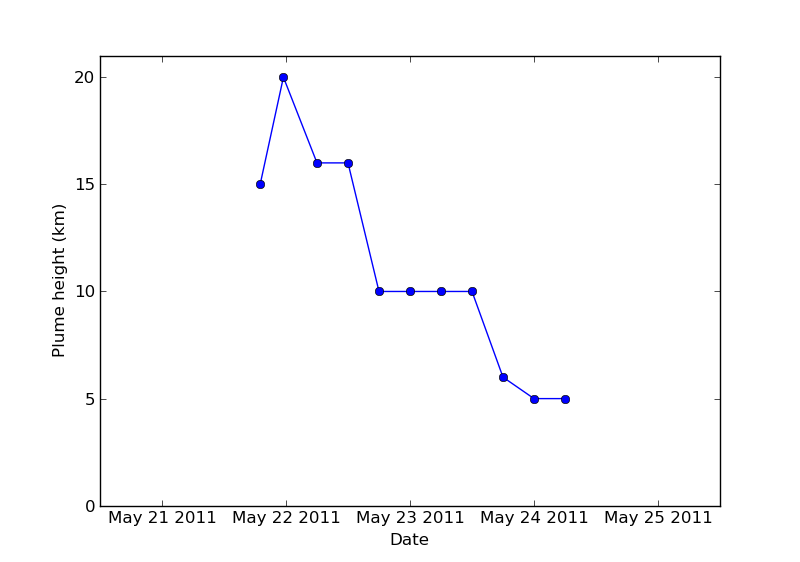
Changes in height of the Grímsvötn plume. The decline corresponds to a massive reduction in the eruption rate. The plume heights are taken from the Met Office website.
Are there any other signs?
Yes. Seismometers at the volcano have measured continuous small earthquakes during the eruption. This is called tremor, and is caused by movement of magma within the volcano. The intensity of the tremor has been declining since the eruption began.
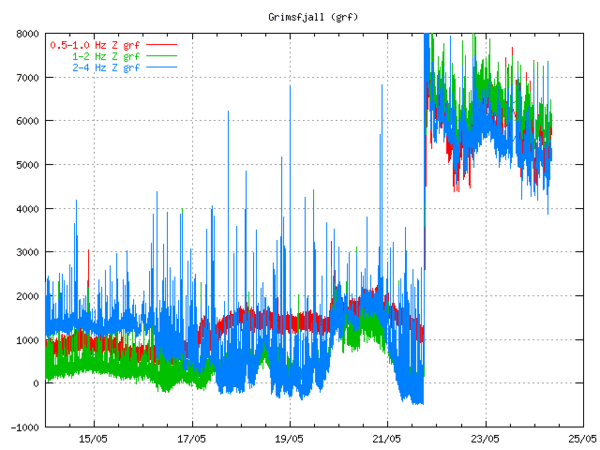
Tremor data from Grímsvötn, showing high, but declining tremor since the eruption began on the 21st May. The plot comes from the Icelandic Met Office website.
Also, GPS measurements on the volcano detected the surface gradually rising since the last eruption, as the magma chamber beneath it inflated. Since the eruption began, the data show a subsidence of 25 cm, as the pressurised magma within the volcano is erupted and it deflates back down. With the pressure in the magma chamber released, the eruption will only pick up again if fresh magma arrives from deeper in the system.

GPS data from Grímsvötn, recording the inflation of the volcano over the last 5 years. The final datapoints record a big deflation during the eruption. The plot comes from the Icelandic Met Office website.
Therefore, unless another vent opens or new magma is injected, it is probable that the eruption will not pick up again and will end completely in the next few days.
So will the ash just disperse?
Yes. The ash above us at the moment was erupted early in the eruption, and the current eruption rate is too low for newly-erupted ash to cause problems in Britain. As the cloud disperses some of the finest grains will remain airborne for days, but their concentration will be too low to cause problems. The new flight rules brought in during the Eyjafjallajökull eruption will get flights back in the air quickly, too. This plot from the BBC website last year shows how the area of airspace that would be out of action is made much smaller by the threshold-based system.
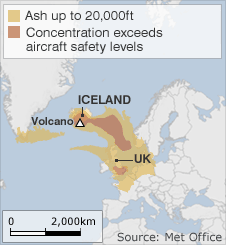
A map published on the BBC website during the Eyjafjallajökull eruption. It shows how changing the rules so that planes only had to avoid ash above a certain concentration (red) instead of avoiding all ash (orange) opened up large areas of airspace.
Will we see ash falling here?
I hope so. Last year some people saw ash falling, but the majority just saw blue skies. This even led some people to say that there was no ash there at all. They were the first ever Ash Cloud Sceptics. They were wrong. Ash grains fell through the air, and in the rain. The figure below shows an example. The ash cloud was measured by lasers on the ground (LiDAR), and sampled during special research flights. The lasers and research planes will be in action again this week.
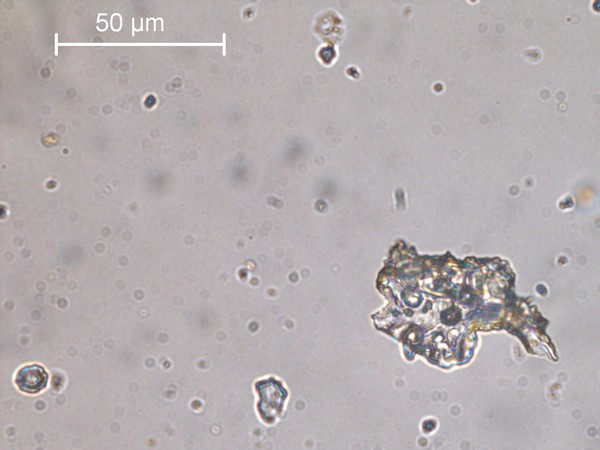
An ash grain from Eyjafjallajökull that was collected in rainwater near Leicester during the eruption last year. Note the glassy, translucent texture, angular shape, and bubbles in crystals within the grain. This grain was transported to the UK in the ash cloud.
With the high winds and the rain, it may be very difficult to see the ash grains. They will be very small, like dust. If you do find some settling where you are, the British Geological Survey would like a sample! Visit their ash collection website to find out how you can help.
The weather has been wild the past few days, and those scenes from Iceland are positively hellish. Does this have anything to do with the Rapture?
No. This has nothing to do with the Rapture. Was the end of the world also foretold by the Grímsvötn eruption in 2004? Or the one in 1998? How about 1996, 1984, 1983, 1972, 1954, 1948, 1945, 1941, 1939, 1938, 1934, 1933, 1922, 1919, 1910, 1902, 1897, 1891, 1887, 1883, 1873, 1867, 1861, 1854, 1838, 1823, 1816 or any of the hundreds before that? No.

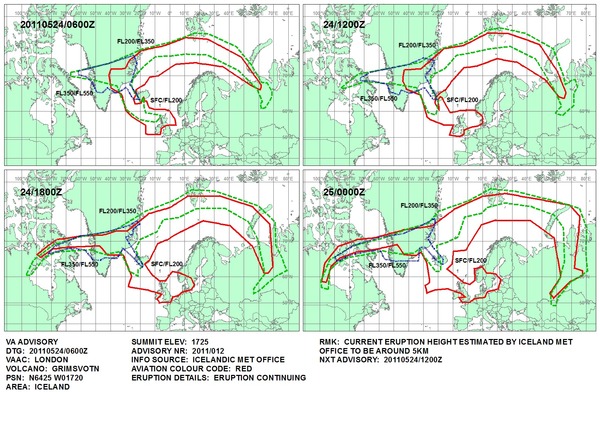

a superb experiment – will try this at home!
What a great run down on the eruption and ash in such perfect language for those of us who are interested in volcanoes but don’t speak volcanologist or geologist!
Cracking blog, sir. The world (and the world’s media) needs more information like this. Keep it up.
Here is another two-part experiment:
1 1/2 oz vodka
3/4 oz dry vermouth
Shake vodka and vermouth together with several ice cubes in a shaker. Strain into a cocktail glass, garnish with an olive and serve. This is Eyjafjallajökull 2010
Then, take:
5 fluid ounces tequila
3 fluid ounces triple sec
2 (6 ounce) cans frozen limeade concentrate
4 cups ice cubes
coarse salt
Salt the rims of 2 large margarita glasses. To do so, pour salt onto a small plate, moisten the rims of the glasses on a damp towel and press them into the salt.
In a blender combine tequila, triple sec and limeade concentrate. Fill blender with ice cubes. Blend until smooth. Pour into glasses, garnish with slice of lime and serve.
This is heaven. Screw the volcano.
Pingback: Experts downplay travel risks as volcanic ash cloud confirmed over UK – All the latest
Incredible Info. And what a way to describe it!!
Pingback: Libya conflict will escalate if Apache helicopters are used, Labour (Nemdil) | Nemdil Magazine